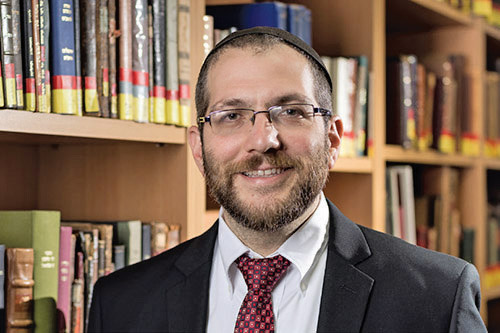



Rabbi Binyamin Zimmerman, chief educator of the Zomet Institute, was the scholar-in residence at Congregation Rinat Yisrael this past Shabbat. During his presentations to the community, Rabbi Zimmerman provided insight into the important work being done by his organization, and also shared examples of how Zomet has positively impacted people’s lives and enhanced their Shabbat experiences. His final presentation, which was held on Sunday morning, was an audio-visual demonstration that focused on the technological equipment Zomet has produced.
The Zomet Institute is an organization based in Gush Etzion, Israel, that is dedicated to helping people “delight in the Shabbat day” by exploring ways to introduce modern technological advances in a way that is still halachically permissible. During his presentations, Rabbi Zimmerman stressed the importance of Zomet’s intent “not to pasken halacha,” but rather to help make for a better, safer Shabbat experience. He likened Shabbat to giving a candy bar to a child and telling them to share it with a sibling. The child will likely give away as little of the bar as possible, which is how people should feel about Shabbat. In an era where everyone is always plugged in, it’s important to never let technological advances compromise the sanctity of Shabbat, he explained. In addition to discussing metal detectors and lights, one of the examples he used to show the good that can come from Zomet’s work was of a young, disabled girl. On Shabbat, without the use of her electric wheelchair, she would become “like a rock” and was secluded to her house, unable to interact with the community. The young girl enjoyed playing jump rope with her friends, but was saddened when she couldn’t because of the restrictions of Shabbat. Due to her disability, her participation was limited to holding one end of the rope, but when it was Shabbat, even that limited amount of participation was unavailable for her. The girl couldn’t fully enjoy Shabbat, but because of Zomet she was provided with a halachically permissible wheelchair that allowed her to truly enjoy it again. As Rabbi Zimmerman explained, one of the chief goals of Zomet is to “help the handicapped go to shul.”
Over the course of his presentations, Rabbi Zimmerman discussed real-life scenarios that would present a halachic dilemma. With examples such as Shabbat elevators, computers, and medical and security needs, Zomet’s website explains how they are making progress in finding ways of “seamlessly merging halachic Judaism with modern life.” Zomet means intersection, Rabbi Zimmerman explained, and he elaborated that in some cases, the progress can even be life-saving. An example of this came when he discussed a gentleman who was ill with a disease that prevented him from being able to speak. Thanks to modern advances, this wasn’t a problem during the week, but during Shabbat it controlled his happiness. Without being able to communicate, every moment of Shabbat he was reminded of his illness, which essentially ruined his ability to enjoy it. Zomet created a special device that allowed him to speak again on Shabbat, and as a result, his moods improved and he was even able to speak at his grandson’s bar mitzvah. Now the man is better and no longer needs the device, but he credits it and Zomet for being the ones who truly saved his life. Thanks to what Zomet did, he didn’t need to resent Shabbat, and instead was able to find enjoyment in it again. Rabbi Zimmerman stressed Zomet’s dedication to upholding the sanctity of shamor and zachor on Shabbat, and explained that the organization’s goal is to keep them intact, but also find ways to introduce advancements that will allow people to enjoy it as much as possible. Without them, he argues, there are people who would be worse off, and Zomet doesn’t want to see that happen.
During Rabbi Zimmerman’s Sunday presentation he demonstrated a number of Zomet products, such as a special outlet and Shabbat light. The highlight of the presentation was the LeeNer, which is a device that serves as a portable, electronic set of Shabbat candles. The LeeNer is ideal for people staying in places such as a hotel or hospital, where lighting candles isn’t allowed, Rabbi Zimmerman explained. Because it uses an incandescent light bulb, it is viewed as an acceptable replacement for hadlakat nerot. Other highlights of the presentation included his insight into Zomet and how they come up with their products, and the enjoyable videos that he shared. Following the presentation, Rabbi Zimmerman opened the floor to attendees, of which there were roughly 50, for a question-and-answer session.
Reception to the presentations were mostly positive, with many attendees commenting on the interesting work that Zomet does. While there were those who had questions about the products, Rabbi Zimmerman listened and responded with class and poise.
Zomet is a not-for-profit organization. According to their website, they are composed of a staff that includes engineers, rabbis and researchers, and have even published 35 volumes of Techumin. Companies that Zomet has been affiliated with include Elite Food Corporation, Ben Gurion Airport and Schindler Elevators. If you would like to learn more about Zomet, you can visit their website at http://www.zomet.org.il/eng/.
By Adam Samuel
Adam Samuel is a journalist from Teaneck. When he isn’t busy reading the daily news, he divides his time between managing his blog, adamssoapbox.blog, and gradually learning how to play piano.










